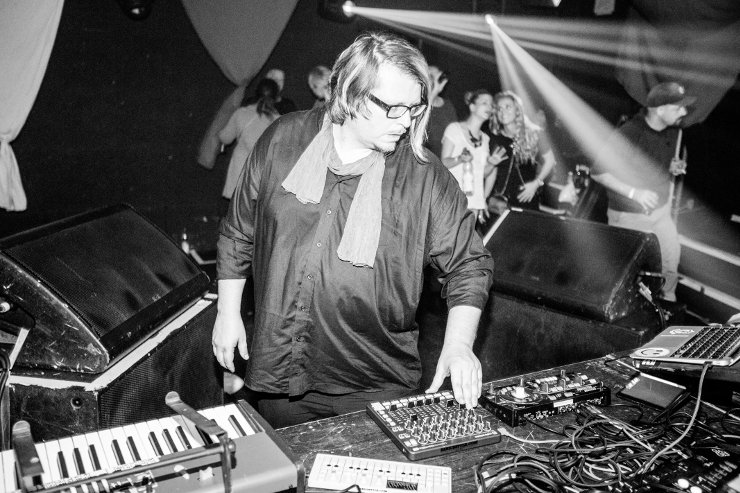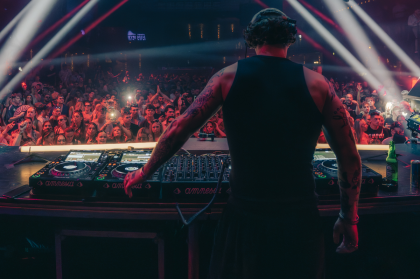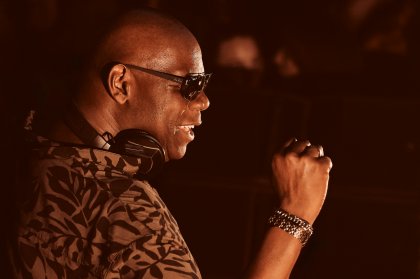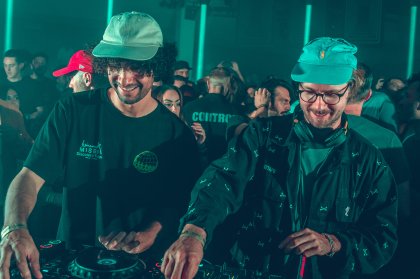
From a young age, millions of us have had our heads tilted toward the stratosphere, crafting all-consuming stories about what extraterrestrial beings could possibly exist in the outer reaches of our solar system. At nine years old, Robert Babicz was lying in bed with his radio under the pillow, tuned into a local German radio station that was playing abstract electronic music. “The key thing was that I thought this isn't music, it's a transmission.” Babicz has synaesthesia, a neurological phenomenon where senses become mingled due to a cross-wiring in the brain - something that has the synaesthetes of this world seeing and tasting sounds, smelling colours and hearing images. “I thought I was able to get alien transmissions through my radio. I was fascinated. I think it's one of the key elements for why this music is touching me, because I felt like this music was coming out of the future. I tried to hide under the bed, but I loved it.”
“I thought I was able to get alien transmissions through my radio. I was fascinated. I think it's one of the key elements for why this music is touching me, because I felt like this music was coming out of the future."
This recalled memory of the driving force behind an extraordinary career that's spanned over two decades under various aliases - including Rob Acid - comes at the end of our candid conversation. However, after digging into the triggered sensations of synaesthesia, I knew it'd wind up being at the core of our chat. Sometimes I've been so overwhelmed by a techno track that I've said I can smell it, but in reality, all I've got flowing through the nasal passages are blasts of sonic enjoyment in the form of sweat. For Babicz, his sensory fluidity is in having the ability to see music and hear images, and quite naturally, for a long time he assumed everyone was seeing shapes in sounds. “Oh no , I'm just the crazy one,” he joked, before claiming the capacity of seeing music in 3D as the source of being able to produce at breakneck speed, with a large majority of tracks being cut in just 24 hours. “I see a geometric structure in time. It's difficult to find the right words, but I have this for every sound. That's why I'm able to compose sounds around me. I'm living half in reality, half in fantasy.” His abiility to see things differerntly means photography is also an essential component of Babicz's art, and his fans know and love his sensitive and dramatic photos from across the globe (one of which is included below, taken in Singapore).

There are studies pointing to the notion we're all born with synesthesia, though most of us lose it by the time we're eight months old, which is a damn shame. Far beyond the eight month stage of humanoid formation, Babicz was able to push the condition's limits, but it wasn't until he was 17 that he found it to be a catalyst to musical creativity. “I had no musical contact at all and my family was very unmusical. When the music virus infected me I told my parents I will not go to university and I will not have a job because I'm an artist. They were of course really, really shocked and super angry.” He was cast as the black sheep of the family and thrown out the family home. As a member of a Polish family who'd fled to Germany as refugees to escape Soviet Communist dominance and growing up extremely poor, they'd pinned their hopes on their son having a better, more financially secure adult life. “When my parents threw me out of home, the first year was super hard, but at that moment I was lucky that my first shows came in so I had little income.” He had a small room in his hometown Cologne, with just a mattress on the floor and a little bit of equipment. “I just believed that I was doing the right thing, so nothing could stop me. I knew if I was struggling a lot, then I'd be hungry because I put all my money into music gear instead of food. I knew if I started a regular job - that if I focused on something else - I will not have enough power to come home in the evening and go really deep into it.”
Luckily for our auditory senses, he got very deep indeed and has carved a career through redefining the boundaries of electronic music, which has had him lauded as a creative genius time and time again. He started locally in Cologne, before venturing into surrounding cities with a sound so distinct that it would become known as Babiczstyle, which is also the name of his own illustrious imprint. Speaking via Skype, I got a near instantaneous smacking of warmth from Babicz, which matches the pre-judgement you'd have of an artist who creates from a deeply emotional and spiritual place. “There is only music that is touching my heart or not. They are the two categories I have for myself.” He's not interested in what he calls “empty function” because while knocking it through a speaker system might hit the spot for five minutes, it's completely empty and therefore lumped in the functionless fodder file. “It's just going right through me. I just see empty buildings. I like more the colourful way. I like it when I see some nice fantasy animals, some dragons - I need something interesting.” He has an ability to communicate beauty and humanity in sound design, which is amplified when playing live, and he's also one of the electronic music world's most in-demand mastering artists – a role he described as being that of a makeup artist. Among Babicz's more than one thousand releases are seven albums and a flood of tracks for labels including Bedrock, INTEC, Mille Plateaux, Systematic, Audiomatique, K2, Treibstoff, SUGA, Punkt and Praxxiz. Currently, he's shifting between various projects from a home studio full of toys. He has enough material for the next few months and on his Babicz label, there's a stockpile of pending releases, remixes and a compilation album in the works with the first batch of artists he's ever signed. Originally the imprint was a platform for his own craftwork, but with so many artists sending him solid material, it became too hard to say no. Four or five tracks - from a Greek, Ukranian, German and UK artist - have been given the green light so far and he's promised a remix for each to bolster their profile.
“There is only music that is touching my heart or not. They are the two categories I have for myself.”
“Human on planet earth” is what his passport would read and that fits perfectly with Ibiza's authentic ethos of embracing all mortals under the earthling umbrella. He's not unloaded his box of tricks in Ibiza since 2011 at Space, but he's been numerous times to soak up the island's notorious atmosphere and beauty. He's in for just one exclusive live gig with Mikaela's techno exploration, ONYX on Monday 18 July and he's in good company, with a solid, refreshing line-up that's loaded with veterans and heavyweights from the scene who aren't commonly heard in Ibiza. He's not yet sure what equipment from his stack of toys he'll pack for the ride, but whatever he chooses, he'll be channeling his synaesthesia and reading the crowd on a whole different, deeper level to many of his peers, so you can expect a magic ritual to descend on Space's sunset terrace.
Buy your tickets here.
WORDS | Aimee Lawrence PHOTOGRAPHY | Cirque du Son, Hamburg





